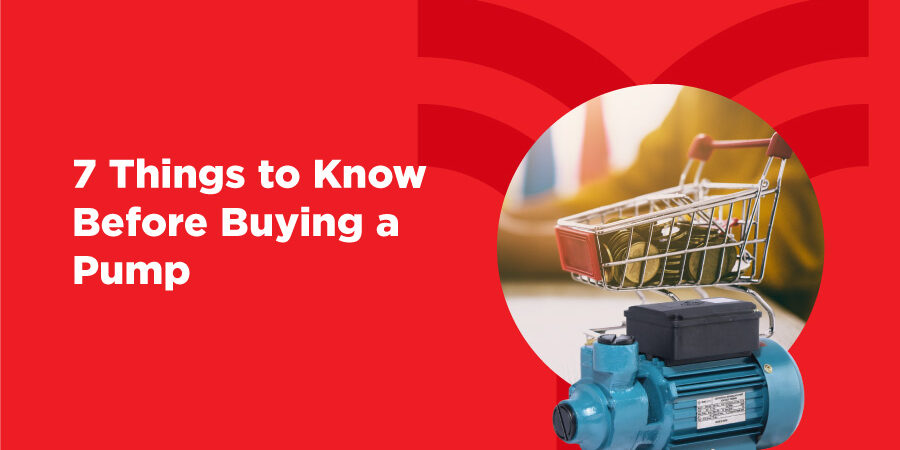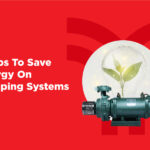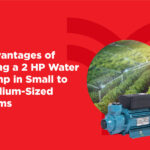7 Things to Know Before Buying a Pump
Whether purchasing a pump for household, commercial, or agricultural use, it is important to do your research. A poorly chosen pump can result in needless expenses, maintenance problems, and even system breakdowns. On the other hand, the correct pump can guarantee lifespan, efficiency, and peak performance. This is a thorough guide from the best Pump Manufacturers in Coimbatore that will help you weigh the seven most important considerations before making your decision.
Understand the Pump’s Purpose
Establishing the function of the pump you plan to purchase is crucial before you even begin to look at other kinds. Since different pumps are made for different uses, it will be easier for you to choose the best one if you know what you need.
Application Needs
Think about whether the pump will be used continuously or sporadically.
Choose the sort of fluid you intend to pump, such as slurry, chemicals, or water.
Determine the necessary pressure and flow rate.
Evaluate the Pump’s Specifications
After determining the kind of pump you require, it’s time to examine the technical details. This will guarantee that the pump satisfies your needs and performs well.
Flow Rate: Expressing how much fluid the pump can move in a specific amount of time, the flow rate is measured in liters per minute (LPM) or gallons per minute (GPM).
Power Requirements: Verify the power rating of the pump, which is often expressed in horsepower (HP) or kilowatts (kW).
Verify that the power supply is compatible (voltage, phase, frequency).
Efficiency: Seek out pumps with excellent efficiency ratings to save money on electricity and running expenses.
If your pumps need to run at different speeds, think about using variable frequency drives, or VFDs.
Material Construction and Durability
The pump’s building materials have a significant impact on its longevity and suitability for various applications. The Selection of appropriate materials can have a major impact on the longevity and functionality of the pump.
Material Selection
Cast Iron: Durable and cost-effective, ideal for most water and wastewater applications.
Stainless Steel: Corrosion-resistant, suitable for chemical, food, and pharmaceutical industries.
Plastic: Lightweight and corrosion-resistant, best for low-cost applications and chemical handling.
Wear and Tear Resistance: Pumps that operate with abrasive fluids or slurries ought to be constructed from materials such as ceramic lining or toughened stainless steel.
To increase the lifespan of your pumps, think about investing in wear parts that can be replaced.
Consider Maintenance and Serviceability
Although all pumps need maintenance, different kinds might differ greatly in how simple it is to do so. Think about the long-term maintenance needs before making a purchase.
Accessibility:
Seek pumps that have easily removable covers or casings so that interior parts may be accessed quickly.
In general, less maintenance is needed for pumps with fewer moving parts.
Supply of Replacement Parts:
Make sure the pump’s replacement parts are easily accessible.
Take into account the price and accessibility of consumables such as impellers, bearings, and seals.
Customer Service:
Verify whether the source or Water Pump Manufacturers in Coimbatore provides trustworthy after-sales support.
Local service centers’ accessibility might be a big benefit.
Assess the Pump’s Installation Requirements
The installation process varies depending on the type and size of the pump. Making sure the installation is simple can help you save both money and time.
Space Requirements:
Make sure you have enough space for the pump, as well as an area for maintenance activities.
If you’re short on space, think about tiny pumps.
Foundation and Mounting:
For certain pumps, a stable base is necessary to reduce noise and vibration.
Make sure the mounting surface can bear the weight of the pump and is level.
Safety and Compliance Standards
When choosing a pump, safety is the most important consideration, particularly for commercial or industrial uses. It is crucial to make sure the pump complies with safety requirements and laws.
Certification:
Seek out pumps that have certification from accredited organizations like ISO.
Make sure that regional and global safety regulations are followed.
Overload Protection:
Select pumps that have built-in safeguards against dry running, overloading, and overheating.
For increased safety, think about pumps with automatic shut-off capabilities.
Evaluate the Total Cost of Ownership
The total cost of ownership (TCO) throughout the pump’s life should be assessed in addition to the purchase price. This covers energy, upkeep, and operation expenses.
Initial Cost vs. Long-Term Savings:
Although they may cost more upfront, greater efficiency pumps can result in substantial energy cost reductions over time.
Think about pumps with extended warranties since they are less likely to break down quickly.
Maintenance and Replacement Costs:
Include in the cost of labor and parts for routine maintenance.
Think about how long the pump should last and how often parts need to be replaced.
Purchasing a pump is a big expenditure that needs to be well thought out in terms of many different variables. You may make an informed choice by knowing the pump’s intended use, analyzing the specifications, taking into account the longevity of the material, estimating the amount of maintenance required, and accounting for installation, safety, and total cost of ownership. This will guarantee that the pump you select fits your requirements, runs well, and offers durable service, eventually saving you time and money.


